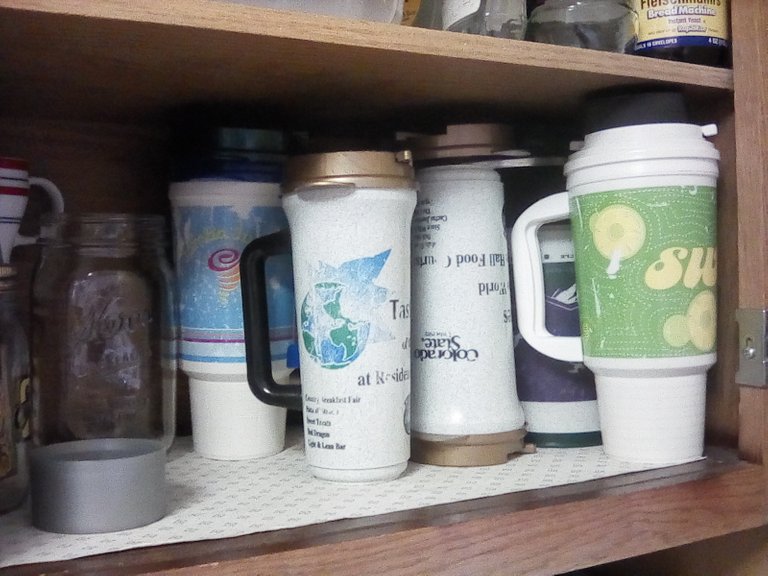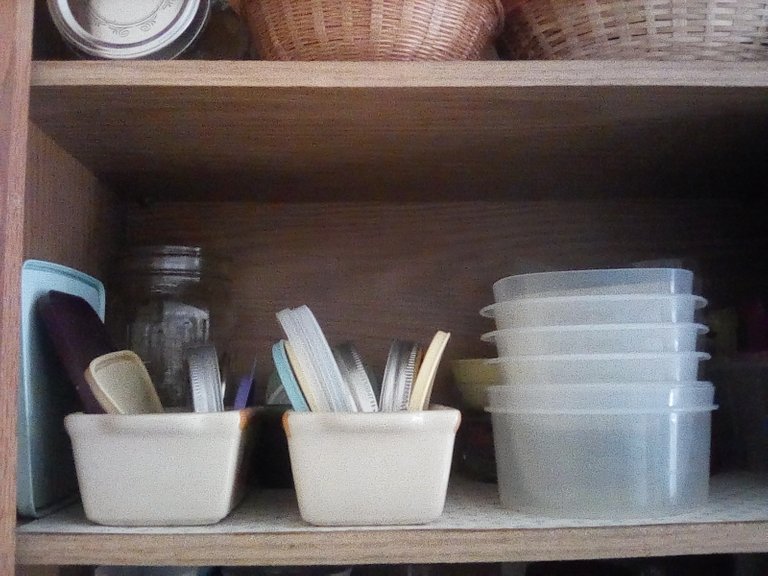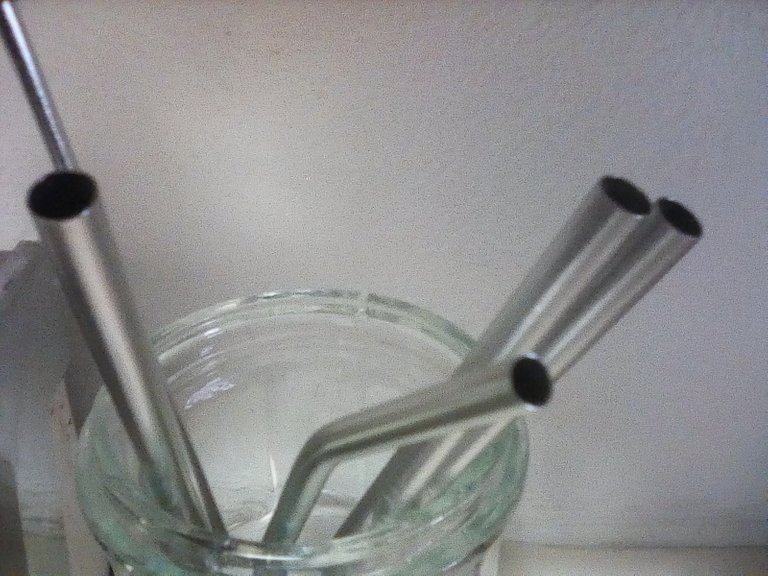Let's Talk About Zero Waste
Zero Waste is a big(ish) trend right now, but y'all, we need to have a Come To Danu talk about some of the things that are going along with that trend. The tl;dr of this post is: you can't shop your way out of environmental pollution.

My oh-so-trendy reuseable mugs that I've had since college in the 90s or a smoothie-juice bar place I used to frequent in the early aughts
All over eco- and green- marketing/blogs/groups/sites online, I see adverts for the latest "green" product. Bamboo cutlery. Beeswax wraps. Stainless steel tiffins. Glass food storage containers. And that's all well and good, but people are emptying their cupboards of perfectly useable things, and either landfilling, recycling, or donating them in order to buy the new, "green" products. But y'all, you are DOING MORE ENVIRONMENTAL DAMAGE that way.
Everything you buy has pollution built into it. That trendy bamboo is almost certainly shipped from China. If you are not near China, that's a whole lot of fossil fuels to do that. There is pollution at the factory making the thing. Etc. I'm not saying that you shouldn't buy bamboo things, I'm just saying that it isn't without resource and pollution costs, because everything requires resources to make. Maybe it's less resources to make a bamboo bowl instead of a plastic bowl and the bamboo bowl won't pollute the Earth for centuries - great! But if the plastic bowl is already in your possession, the resource/pollution has already been made. Getting it out of your house doesn't erase its footprint, it just gets it out of your sight. The only way to mitigate the footprint of things is to use them up as much as possible so that you don't need another thing.

My definitely-not-minimalist-or-plastic-free food storage containers
Here's what I mean. Purveyors of plastic shopping bags LOVE to cite that there is less resource input for a plastic carry bag than a cloth bag. That's true. But that plastic bag will be used once - maybe twice? - and then thrown away. Using the cloth bag above a certain number of times makes it the greener choice (according to this article, that number is 171 times for a canvas bag. I've seen varying numbers though depending on the study and what factors they look at).
If you are buying a new cloth bag every time you forget your cloth bag at the store, you are probably doing more damage. But if you remember your bag and use it for years, you are way ahead (and if you drive and forget your bag in the car ...just take your stuff out of the grocery store in loose in the cart and pack it in the bag at the car).
This math is true for every product you consume. The amount of resources/pollution that goes into a paper coffee cup vs. a reuseable mug is going to be less, but if you use that mug x number of times, it beats out the paper one as far as inputs go.
So, if you think "zero waste" means "no plastic in my house," and you gather all of your Tupperware-type containers and cart them off to a bin somewhere and buy new things, you just did more harm than good. You should use that Tupperware stash until it's actually worn out and needs to be replaced, and THEN you can buy whatever the new, green option is. Every use of that Tupperware past its input costs makes it the greenest choice.
"But I donate them," I hear you say. A) not all donations in the donation bin actually get sold in the thrift store; they throw a lot of things away that won't sell. Just like "aspirational recycling," aspirational donating is a thing and people put things in a bin that no one needs or would pay for. B) even if it IS sold in the store - you've just foisted your "problem" off onto someone (who is probably poorer than you) else; those polyester clothes are still going to be shedding microfibers in THEIR wash, those leeching plastics are still going to be leeching into THEIR food.
"But I recycle them," I hear you say. Recycling - especially plastics - is largely a panacea. When it happens at all (which it more often than not doesn't), plastic can only be downcycled and eventually it can't be recycled any more. And of course, recycling products requires resources and creates pollution. Perhaps less pollution than making new plastic, but it's still not a freebie.
The greenest choice is to use what you already have. Once it's worn out, yes, please, go buy the eco chic cool thing that you covet. If you were buying/using disposables before, sure, go buy the reuseable version of something you didn't have before. But KonMari-ing your Tupperware cabinet just to give yourself an excuse to buy that cool thing you saw on a minimalist blog when you could really just use the containers you already have isn't "being green." It makes you happy maybe, or it's a status symbol even (some people do flaunt their eco/vegan/minimalist lifestyle the same way some religious folx flaunt how pious they are), but it isn't the environmentally-friendly choice.

I did totally buy stainless steel straws, because I was buying disposables before and use them every day
Zero waste isn't generally glamorous or Instagrammable. It's more often a pile of mismatched containers in your cupboard, a compost collection on your kitchen counter that's maybe gotten a little stinky because you forgot to empty it outside, and clothes that you have patched up and cloth bags that are stained because you've had them since 1998 (true story, bike tires scuffing against your canvas bag because you rode home with your shopping on the handlebars does not come out in the wash). Throwing everything out and buying a new capsule wardrobe and green dishes and whatever else is a lifestyle choice - but it's not a green one. Nature is often slow. So should be how often you replace things you own (planned obsolescence notwithstanding).
Now I'm not saying you shouldn't downsize - I am too. But I'm not downsizing to replace, I'm downsizing to stay small. It would be different if I gave away my yarn stash as an excuse to have a spending spree at the yarn store. That's the kind of thing I'm talking about here. The new zero waste doohickeys can be great - but not if they leave a full waste bin in their wake.
If you want to be green - live by the old depression-era motto of "use it up, wear it out, make do, or do without." If you just want minimalist kitchen cupboards with really cool curated things you will use and get joy out of, that's fair - but say that you want that because it makes you happy, not because it's solving the pollution problem.
To listen to the audio version of this article click on the play image.

Brought to you by @tts. If you find it useful please consider upvoting this reply.
You are right phoenixwren. I was sad to see the clothes donation box in my neighborhood looked like a garbage bin recently ... :( We shall use what we have and when we have to buy something new we shall go for a greener option.
By the way I found bees wrap somehow works in my kitchen. Not for all the case though. After using it for almost a year, somehow I became a friend with it. I'll write about it.
Your being crafty I'm sure helps you to create less waste! Sewing and such are such useful skills to have.
Cool about the beeswax wraps! I haven't tried any because I just use the Tupperware type containers I have and I never used plastic wrap to begin with. But sometimes I've put a pot or large mixing bowl in the fridge with a plate over it; a beeswax wrap would probably be better. X3
Plates are good covers. I do the same too :)
I was wondering what do I use the wrap instead of Tupperware style containers. I use it to cover cut surface of lemon and cucumber. Also for ginger. I use it to wrap my daughter’s sandwich, which will be broken in a large container. When I have a small bag, it’s convenient after eating food inside. I can fold it to flat. These are my use cases of the wrap.
I enjoy my improvement process to reduce waste to zero :) I agree with you to use the things we have in our hands.
Posted using Partiko iOS
Oh those are some great ideas! Are they easy to clean? Do you put them in the wash, or just wipe them down after?
I found it's not easy to clean (wash + dry) a large one in my small kitchen. So I cut it in piece, 1/4 of the original size. It's around 10cm x 10cm - 15cm x 15cm :) It cannot wrap my adult size sandwich but I can use a container for mine.
Awesome points you made here Phe! I especially loved this line, it really summed it all up:
Great post Fre!
Thanks, fren! :)
yes especially in denver - where recycling is a total joke - I mean I even think now htat they just toss the recycleing in the ocean on it's way to china - but I grew up recycling so it amazes me that denver does not even try to recycle - if you live in a building of more than 7 units you don't get recycling - what the heck is up with that?? and zero waste - we have a zero waste store over by the natural grocers on tennyson and 38th - it's good in a lot of ways but I agree with you that there really is no zero waste living in the city. If I was in the country living totally off the land and using up eveyrthing I used and not shopping, well then maybe, but there just is no zero waste living in the city...
My building thankfully has recycling, which it didn't for the first several years I lived here, but yeah - Denver's recycling rates suck. Just because I sort it correctly doesn't mean it's actually recycled, what with a) people putting things in that don't belong ALL THE TIME like plastic bags which contaminate the load; b) most glass in the single stream is so destroyed by the time it gets through they don't recycle it but use it as landfill liner; and c) China not taking our plastic to recycle anymore.
Which is why I try and reduce as much as I can, but am not perfect.
I tried to get my building to sign up for composting service, and their response was no, because they were afraid it would attract the mice. But the mice are attracted to rotting food in the open dumpster whereas if we had a compost bin, it would be sealed with a lid. But the dumpsters are not where we see mice, they're in apartments, they said, and people's collection bins would attract them. Well same argument - their trash can or leaving it out on the stoop (which they do) would attract them, and the little bins in our apartments WOULD HAVE LIDS. But still no. I compost in dual buckets on my balcony. Never had mice.
yea my building has over 7 units so I have to take my recycling to arvada which is just way out of my sphere so it piles up in the kitchen. When I worked at home depot and just saw how much stuff got thrown away everyday I knew that this is the Denver way -
Yeah before my building opted to pay for the service (we have like 50+ units, so we're not in the city system, either), I used to carry my bag of recyclables to work and dump it in their bin. LOL. Everyone thought I was nuts, but I don't have a car and I was determined.
I used to work at HD too. I still take CFL bulbs there to recycle, and have cans of paint I bought from the returns shelf where a quart was $1 and a gallon was $5. It's mad how much paint gets returned (I used to work the returns desk). Had a guy once return over $300 worth of paint because he had left it in his trunk overnight in subzero temps and it froze. Well no shit, Sherlock, what did you think was going to happen? BUT THE MANAGER TOOK THE RETURN. I was like ...someone's dumbassery is a valid return reason? OK.
that is the kind of crap that has ruined us as a culture - when the bottom line is so important that we reward people for doing dumb shit instead of letting them learn something and be responsible next time - I saw at home despot and at king stupids and slave-away - all my crappy jobs...LOL - but back to recycling - yea I used to take my recycleables to my friends purple bin in Longmont - till she got sick of me -
Congratulations, your post has been selected to be included in my weekly Sustainability Curation Digest for the Minnow Support Project.
Hooray, thank you! :)
Great post, and really good points. Too many people try to go green and waste a lot of resources in the process.
I've recycled for decades, and happily, now that I'm In a rural community in the middle of nowhere, our recycling center is magically less than ten minutes from home. It's far closer than when I lived in the city.
I cook the vast majority of my meals at home, using real food and few packaged ingredients, with any waste being fed to the animals or composted.
I'm aiming for no plastic, but far from there yet, and have a number of multiple use containers that get a lot of use . . . I learned long ago to cook in quantity and freeze individual portions, thus saving time and money.
Most long term storage in my kitchen is in canning jars, which get lots and lots of uses over the years. We also have a vacuum sealer, that does use plastic (often mylar), but saves us money by preventing waste.
My travel cups are stainless steel, and have mostly been gifts. And I use them frequently.
I typically buy clothes used, partly because I hate shopping for clothes in the first place, and partly because I learned in college that the donated clothing in wealthy neighborhoods was nicer and better made than the brand new stuff in most shops and department stores. (I went to college in L.A., and UCLA, where I took several classes, was right next to Beverly Hills, California).
My cars I nearly always buy used . . . let someone else take the showroom loss. I'm just as happy with a well-maintained car that's a couple of years old.
We create very little actual trash. We use, reuse, recycle, compost and donate, to the point that we throw away less than a quarter of what most people do, and often less than even that!
And the things I donate are actually still usable, long term, and not trash. And they do get used.
My parents taught me growing up to purchase the best quality I could afford, and that has stood me in good stead.
By holding out for quality, I replace things far less often, and that does save resources, not to mention lots of space in the landfill.
Posted using Partiko Android
The number one thing I have found the quality thing to be true about is shoes. I grew up buying the cheapest Payless shoes possible. They hurt my feet, they fell apart in a year, and I had sciatic nerve problems, but they were cheap and I was poor. Then I went to medical assisting school where we were required to wear white shoes. I had no white shoes - I wear brown and black shoes - so I went to a scrubs store and bought nursing shoes. OH MY GODS. My sciatic nerve quit pinching, my feet didn't hurt, and lo - those shoes are still around like 15 years later (granted, I haven't worn them regularly since I've not been in a job where I wore scrubs in several years, but the point is they got a lot of use for several years and are still intact). Since then, I've changed my ways. I wore a pair of Doc Martens for about five years - am on pair #2 which are about two years old I think. My winter boots are about as old as well. And both are far more comfortable than anything from the cheap store! I have fewer, nicer, kinder to my body, but last a long time shoes. And it's way better!
I totally agree.
I wore cheap shoes for years, and when my former spouse went to a podiatrist, it occurred to me to ask whether my chronic back pain might be related to my shoes.
Yes.
He told me to buy New Balance, and only New Balance, which is all I wore for years. And, while I've always been pretty easy on shoes, they lasted far longer than the cheap shoes I had before.
I've branched out into other brands now, but I still am a stickler for shoes that feel good out of the box. And they last.
Posted using Partiko Android